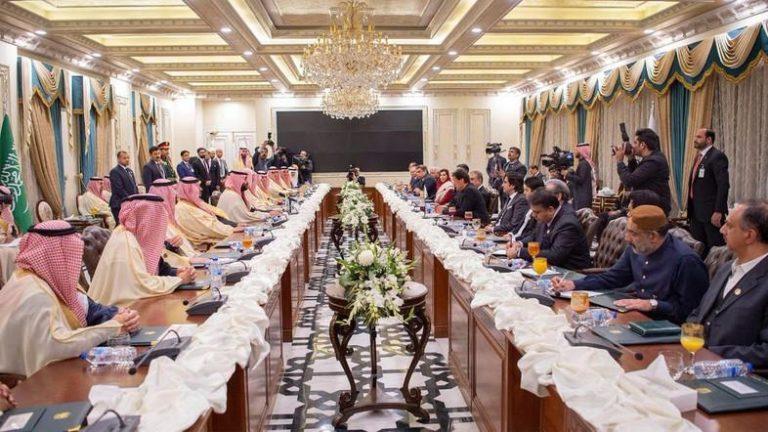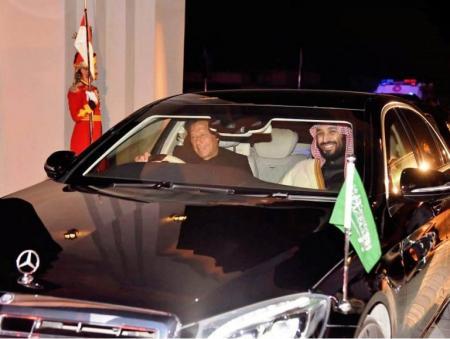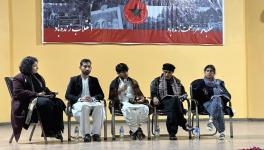The Geopolitics of Pulwama

Saudi Crown Prince, Pakistan PM chair joint Supreme Coordination Council session, Islamabad, February 18, 2019
It is improbable that Prime Minister Narendra Modi holds a motor car driving licence. And it is an intelligent guess that even if he did possess one, Modi will not emulate Pakistan Prime Minister Imran Khan by driving the car from Delhi airport bearing the visiting Saudi Crown Prince Mohammed bin Salman when he lands on Indian soil tonight.

Simply put, India cannot — and need not — hope to have a relationship with Saudi Arabia, which is a patch on Pakistan’s alliance with that wealthy, oil-rich kingdom.
Suffice to say, by queer coincidence, a terrible beauty is born on February 17-18 on the South Asian chessboard. The resilience of the Indian foreign policy and its diplomatic clout in isolating Pakistan and compelling it to abandon the policy of sponsoring terrorist groups in J&K is being put to test.
Theannouncement in Islamabad by the visiting Saudi Crown Prince of his whopping $20 billion investment plans as “first phase” in a profound programme to resuscitate the Pakistani economy — and that too, coming on top of the $3 billion cash bailout and another $3 billion deferred payment facility for supply of Saudi oil — can only be seen as an early warning to the Modi government to wake up from its 5-year old stupor confusing Indian strategy in a complicated world with Modi’s self-image as a world statesman.
Ihis is not about money alone. In geopolitical terms, MBS’ visit highlights that it is impossible to “isolate” Pakistan. And that is not because of the traditional fraternal ties of Muslim brotherhood (no pun intended) between the Saudis and Pakistanis. The heart of the matter is that Saudi Arabia, the UAE, Israel and Pakistan also happen to be key players in the new Middle East Security Alliance (MESA) that the US is actively promoting currently in the Greater Middle East, the region that stretches from the Levant to the steppes of Central Asia.
The Pulwama tragedy has blown to smithereens the Modi government’s foreign policy assumptions toward the Middle Eastern players. The sad reality is that India’s political elites (not only at the central level but also at the state level) have come to view the Arab sheikhs in the petrodollar states as milch cows, which completely overlooks that India can never have a convergence with those brutal autocratic regimes in values or at the geopolitical level.
Saudi Arabia and the UAE stand at the opposite end of the spectrum vis-a-vis India when it comes to the issue of terrorism. The extradition of Christian Michael from the UAE (presumably, as quid pro quo for the shameful surrender of Sheikha Latifa, the rebellious daughter of the ruler of Dubai) does not alter this stark reality. Plainly put, the UAE and Saudi Arabia have acted in the recent history as the locomotive of “jihadi terrorism”. (here , here and here) The sooner Indian foreign policy adapts to this geopolitical reality, the better.
As for Israel, the Modi government has fundamentally reoriented India’s policy toward Israel by needlessly injecting into the relationship an ideological content, where none exists. It overlooks that Israelis are rank opportunists who are motivated by self-interests. During his visit to Israel in July 2017, Modi committed an appalling act — out of deliberation or simply due to lack of erudition, perhaps — by paying homage to Theodor Herzi, the founder of Zionism, in Jerusalem.
(Prime Minister Narendra Modi with Israeli Prime Minister Benjamin Netanyahu visit the tomb of Theodor Herzl, in Jerusalem, Israel, July 2017)
On the other hand, on Modi’s watch, India’s Palestine policy has been reduced to mere tokenism. At any rate, the Indian elite failed to anticipate that Israel and Pakistan are actually birds of the same feather as Saudi Arabia and the UAE, who sponsor terrorism and deploy terrorists to foreign countries as statecraft. If the US has its way, these 4 kindred states will now for all purposes provide the steel frame of the MESA in a vast region that forms our western neighbourhood.
Equally, there has been a specific report recently of an Israeli plane landing secretly at the Noor Khan Airbase in Rawalpindi and left after several hours, which coincided, intriguingly, with the visit by Netanyahu to Oman in November. It fuelled the speculation that the Israelis might have had a secretive pow-vow with the all-powerful Pakistani military leaders. Some in Pakistan even thought Netanyahu had flown in for a quiet chat with Imran Khan.
Equally, reports have appeared recently regarding an Israeli military and intelligence presence already in Afghanistan, which could not have happened without the knowledge of Islamabad and tacit acceptance by the Pakistani military establishment.
On the other hand, today, Saudi Arabia and the UAE are Israel’s covert allies in West Asia. They are joined at the hips in the project to overthrow the Iranian regime. We may expect that the Af-Pak could become a major theatre from where their covert operations would be launched with the help of Pakistan under the watch and protection of the US to destabilise Iran. Tehran has repeatedly alleged that the two Arab states are working in tandem with the US and Israel.
After last Tuesday’s fedayeen attack in Iran’s southeastern region of Sistan-Baluchistan bordering Pakistan (in which 27 Iranian troops were killed in circumstances eerily similar to what happened in Pulwama), top Iranian generals have openly alleged the role of Pakistan’s Inter-Services Intelligence. Unsurprisingly, Saudis and the Emiratis who are bankrolling the Pakistani economy, have come to call the shots in Islamabad and Rawalpindi. Tehran is expecting turbulent times.
All this makes the US’ demonstrative act of commiserating with India over the Pulwama attack highly dubious, bordering on the diabolical. For the Trump administration today, Pakistan’s cooperation is critical for ensuring that a long term American military presence is established in Afghanistan. Although the US’ capacity to leverage Pakistan has diminished, the Pakistani elite’s “westernism” is still very much alive and the Saudi and Emirati clout in Islamabad and Rawalpindi supplements the American diplomacy.
Therefore, we have an explosive mix today, such as we have never come across before in our region and which no one could have foreseen previously — except, indeed, the astute mind of Hamid Karzai— whereby the Taliban leadership has come under immense Pakistani pressure to eschew its “Afghan-ness”) and accede to the US wish list on an open-ended military presence in Afghanistan (which is also backed by Saudi Arabia and the UAE as well as Israel.)
Of course, there is resistance from within Taliban ranks to a settlement on such humiliating terms that militate against the Pashtun national pride and makes nonsense of the Taliban’s folklore of Afghan “resistance”. But the ISI has begun a vicious crackdown on such recalcitrant / irreconcilable elements within the Taliban leadership with a view to bludgeon those hapless fellows into submission.
What the Saudis and Emiratis are expecting as follow-up in the near future is a certain “rebooting” of the traditional Afghan-Islamist ideology of the Taliban and its quintessentially natioanlistic “Afghan-centric” outlook with a significant dosage of Wahhabi indoctrination, which would make it possible integrate the Taliban into the global jihadi network and co-habitate it with extremist organisations such as the variants of Islamic State or al-Qaeda (who have proliferated in the Middle East in the recent years), so that geopolitical projects can be undertaken in regions such as Central Asia and the Caucasus or Iran from the Afghan soil, under a comprador Taliban leadership.
If anyone can tweak the Taliban’s Pashtun DNA and morph it into a Punjabi DNA, it is only the Pakistani military establishment and ISI which can do it. The Saudis and Emiratis (and the Americans) expect the Pakistani military to fulfil this transformative act as quid pro quo for the tens of billions of dollars that are being doled out by them to keep Pakistan afloat.
India’s strategists and policymakers should have a thorough rethink of their options. Clearly, it requires vast intellectual resources and our security-centric set-up may be short of it. No doubt, thestopover by EAM Sushma Swaraj in Tehran in the weekend was a symbolic step in the right direction, but it is too little, too late. India should show spunk to stand up to Trump’s bullying and take practical steps to nurture and preserve the strategic understanding with Iran, which previous leaderships had bequeathed to Modi (including late AB Vajpayee who had a keen sense of history.)
The point is, Iran is India’s lone natural ally in the region. The Pulwama tragedy should awaken us to this geopolitical reality. The time has come to rapidly revive the verve of the India-Iran strategic understanding, which has always been in our core interest as a factor of regional security and stability.
Again, a geopolitical matrix analogous to the Afghan jihad of the early 1980s is appearing. However, alas, there are people among the Indian elite — within the establishment and the media — who have already rushed to celebrate that the US national security advisor John Bolton twice telephoned Ajit Doval regarding Pulwama. Shame on them!
They do not know who Bolton is, what his real intentions could be. Bolton was a vociferous ideologue of the US’ Iraq invasion; he is today rooting for a permanent US military presence in Syria, Iraq and Afghanistan; and, most importantly, he is almost maniacally obsessive about the regime change project on Iran. He has made a handsome living out of such malignant dogma.
Fundamentally, he is a creation of the Israeli Lobby in the US, which manipulated his appointment to this key position as NSA in the Trump White House. Considering all this, the motivation behind Bolton’s commiserating words over the Pulwama tragedy must be properly understood. Make no mistake, there is iron in his soul.
At the most obvious level, Bolton has projected the US as India’s most sincere ally in the fight against terrorism. Two, he has subtly conveyed a US “tilt” toward India — and against Pakistan. Three, he has introduced the US into a mediatory role that enables it to finesse the Indian reaction to Pulwama in the coming days and weeks and may have created a vantage point from where Washington can easily insert itself into any India-Pakistan confrontation.
What our strategists can ignore at India’s peril is that a US intervention is to be expected at an early stage of any India-Pakistan confrontation. Washington will no doubt use any emergent situation to elicit greater cooperation from Islamabad in Afghanistan. But Delhi cannot expect the US to work for Indian interests. Nor can India hope to achieve anything durable out of a military confrontation with Pakistan.
The stakes are simply far too high for President Trump to end the war in Afghanistan and to consolidate a permanent military presence in the Hindu Kush in a post-war Afghan scenario, which is integral to the US global strategy to counter China and Russia. India is of no utility for the US to attain this objective. On the contrary, a compliant Pakistan will also expect that the US takes note of its ‘legitimate’ interests vis-a-vis India.
That is why, we must take careful note, without fail, of the recent testimony at a US Senate Armed Services Committee hearing this month by the commander of the US Central Command General Joseph Votel that Pakistan will always be a “country of importance” to the United States. Gen. Votel said, “If Pakistan plays a positive role in achieving a settlement to the conflict in Afghanistan, the US will have opportunity and motive to help Pakistan fulfill that role, as peace in the region is the most important mutual priority for the US and Pakistan.”
He added, ominously without elaborating publicly, “Our posture with Pakistan involves supporting our colleagues at the Department of State as they pursue a diplomatic solution with Islamabad to end the conflict in Afghanistan while ensuring that Pakistan’s equities are acknowledged and addressed in any future agreement.”
Clearly, Bolton is playing the long game, and Modi government should not fall for it. The geopolitics of Pulwama is highly complicated.
No daylight is possible: Saudi Crown Prince and Pak PM in tight embrace
The Saudi Crown Prince’s historic visit to Pakistan marks the formal induction of Pakistan into the US-sponsored Middle East Security Alliance. This geopolitical reality will haunt the Modi government’s strident diplomatic campaign against Pakistan every inch of the way in the weeks and months ahead and stymie all Indian attempts to isolate Pakistan.
On the other hand, Pakistan senses that it has come breathtakingly close to taking revenge against India in Kashmir. The Pakistani establishment thinks, rightly or wrongly, that India’s “East Pakistan moment” has come and it is payback time now. And having embedded itself within the MESA and made itself indispensable to an Afghan settlement that will save face for the US and NATO and provide underpinning for American bases in Afghanistan, Islamabad is brimming with confidence that no matter what Bolton might have whispered to Doval, there is precious little that Washington can do — or will dare to do — to compel it to let go its agenda toward J&K and India.
Get the latest reports & analysis with people's perspective on Protests, movements & deep analytical videos, discussions of the current affairs in your Telegram app. Subscribe to NewsClick's Telegram channel & get Real-Time updates on stories, as they get published on our website.
























